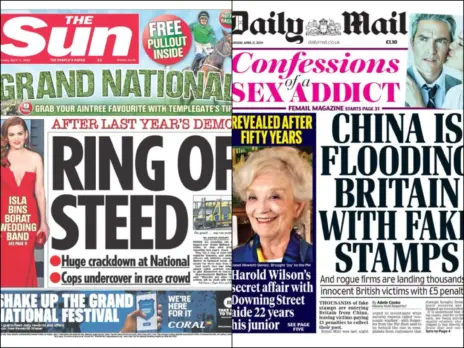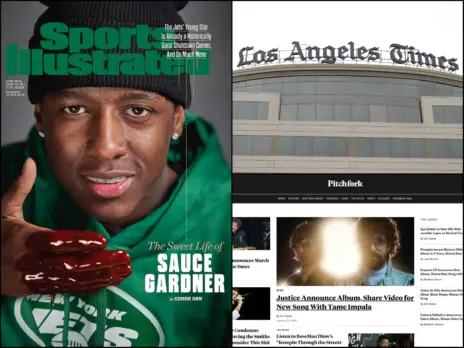
The FT’s media correspondent Mark Di Stefano has resigned after listening to a “confidential and sensitive” in-house video call during which staff at The Independent were informed about Covid-19-related cutbacks.
Di Stefano is understood to have been suspended after the matter came to light earlier this week.
The FT said: “Last week, the FT received a complaint from The Independent that a reporter had joined a staff conference call without authorisation. Access details had been shared with him. The journalist in question has now resigned from the company. The FT wishes to apologise to The Independent and the Evening Standard, which subsequently informed the FT that the same reporter had accessed a meeting it had held.”
Press Gazette understands that no legal action is being planned by Independent Digital News and Media, which owns the Independent.
The FT said it would be offering no further comment and it is not clear whether the matter will be the subject of an inquiry under the paper’s in house system of regulation. The FT is not a member of any press regulator.
Di Stefano said on Twitter today: “Hi, letting everyone know today was my last day at the FT. This afternoon I offered my resignation. Thank you everyone who has given support. I’m now going to take some time away and log off x.”
Media law expert David Banks, a former editor of MacNae’s Essential Law for Journalists, said the incident could constitute an offence under the Computer Misuse Act.
The act states:
(1) A person is guilty of an offence if—
(a) he causes a computer to perform any function with intent to secure access to any program or data held in any computer [F1, or to enable any such access to be secured] ;
(b) the access he intends to secure [F2, or to enable to be secured,] is unauthorised; and
(c) he knows at the time when he causes the computer to perform the function that that is the case.
Banks said: “So, the action here is logging into the meeting and causing the host computer to give you access.
“In the USA the FBI has issued warnings that so-called ‘Zoom bombing’ is a criminal offence, I haven’t seen similar warnings from UK authorities yet.”
However another media law expert, who declined to be named, said that if the link to the meeting was sent to the FT reporter by a source – accessing it may not have been a criminal act.
They said the second issue would be around whether or not a meeting which was attended by 100 journalists could be described as private. This was, they said, debatable.
They added, though, that unless the journalist was given clearance in advance to eavesdrop on the meeting they would have likely committed a breached of the IPSO Editors’ Code (which the FT follows).
Before authorising the use of subterfuge, editors must be able to show they had a reasonable belief that they could justify doing so in the public interest.
Lawyer Matthew Dando of Wiggin said: “It’s easy to see how premeditated Zoom-bombings – where someone intentionally accesses an online meeting which they weren’t authorised to access and which they knew they weren’t authorised to access – could trigger liability. But the terms on which online meetings are set up, the failure of organisers to lock them down and the means by which people access the log-ins, will give rise to real, fact-specific issues of privacy, authority and misuse.
“Whilst the Computer Misuse Act is undoubtedly a weapon in the enforcement armoury, there’s reason to doubt the authorities’ appetite and resourcing to pursue prosecutions. The legislation has been criticised for being outdated, has given rise to a comparatively small number of prosecutions each year despite the high number of cyber-crimes and doesn’t account for the practical problem of perpetrators often being based overseas.”
Staff at The Independent were told about impending cutbacks via a Zoom video meeting last week.
Di Stefano’s name appeared briefly on the screen to show he was joining the call, with his video disabled, before then logging off, according to The Independent. Five minutes later a separate unnamed account joined the call.
The Independent claims this other anonymous Zoom user was linked to a mobile phone used by the FT reporter.
The Independent, reports that the same mobile phone called into another Zoom meeting in which cuts were announced by Evening Standard editor George Osborne. The Standard is a sister title to The Independent.
Independent editor Christian Broughton said: “We respect freedom of speech and understand the challenges of newsgathering, but The Independent considers the presence of a third-party journalist in a staff briefing to be entirely inappropriate and an unwarranted intrusion into our employees’ privacy.
“Our spokesperson had a full statement prepared for the press – any interested reporters only needed to call and ask.”
The FT requires its staff to follow the Editors’ Code of Practice.
It states: “The press must not seek to obtain or publish material acquired by using hidden cameras or clandestine listening devices; or by intercepting private or mobile telephone calls, messages or emails; or by the unauthorised removal of documents or photographs; or by accessing digitally-held information without consent.
“Engaging in misrepresentation or subterfuge, including by agents or intermediaries, can generally be justified only in the public interest and then only when the material cannot be obtained by other means.”
Di Stefano, who has more than 100,00 followers on Twitter, joined the FT from Buzzfeed in January.
Email pged@pressgazette.co.uk to point out mistakes, provide story tips or send in a letter for publication on our "Letters Page" blog







